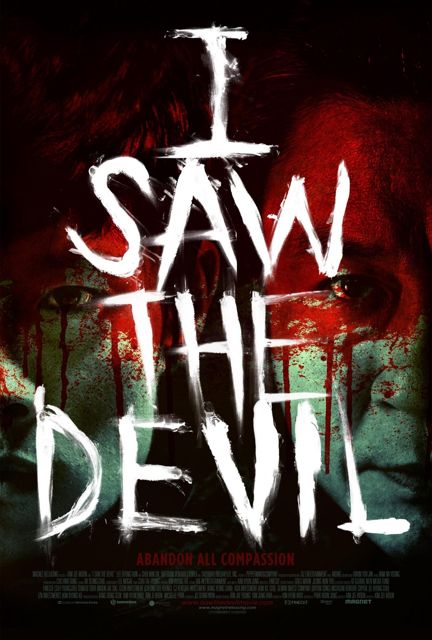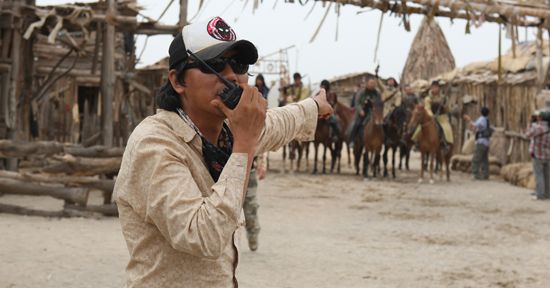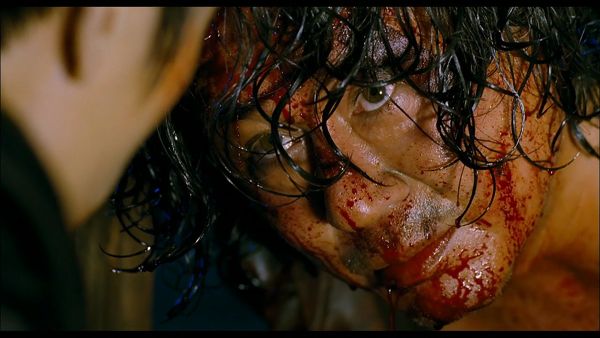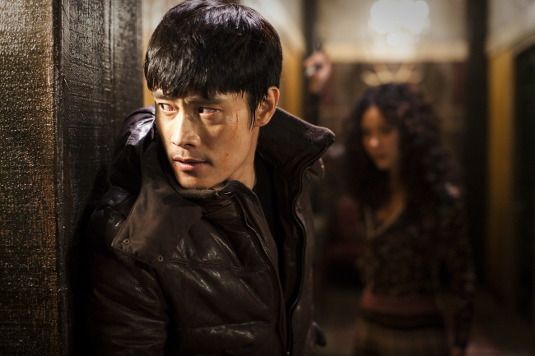Ahoy, squirts! Quint here with more of my Sundance interview catch-up! This time we have possibly my favorite chat to come out of Park City. It was a big deal for me to interview Ji-Woon Kim and Byung-hun Lee. I mean, when else could I talk with South Korean filmmakers, especially when Kim is at the top of his game now with his directorial powerhouses THE GOOD, THE BAD AND THE WEIRD and I SAW THE DEVIL.
This was the first interview I locked in and the one I was the most excited for.
And it’s a good chat, I think. Doing translator-assisted interviews is always awkward because there are long pauses between asking a question and getting it answered, which really takes the conversational aspect away from these chats. If you’ve read anything I’ve done you’ll know that I lean on the conversational stuff like a big ol’ crutch, so I feel a little naked without the ability to spin a little conversation to get people talking.
But I think I did okay here. So, read along as director Ji-Woon Kim, star Byung-hun Lee and I discuss the dark world of I SAW THE DEVIL, how the original script evolved once Kim joined the project and the reason why South Korean cinema is so amazing right now. Enjoy!

Quint: I’m a big fan of your work. I especially loved THE GOOD, THE BAD, AND THE WEIRD. I’m a huge Sergio Leone fan, so to see such a love letter to him was really a big thing for me. I’m also quite a fan of I SAW THE DEVIL. I really enjoyed the whole cat and mouse aspect to it and I loved that the line between the villain and the hero was very blurry. Is that what attracted you both to the film?
Ji-Woon Kim: To explain the process of coming to the script for this film… The script was already written by someone else and it wasn’t my script that I was working on. The original script you could say was a lot tougher and it was definitely more focused on the action than the emotions of the characters, especially Soo-Hyeon. If other revenge films were very intent on portraying the completing their revenge and having an ending that’s a false kind of happy ending, where he’s morally justified in exacting that revenge, you could say that this film is definitely much greyer in that area by the end of the film.
By having the villain and the protagonist meet at the beginning of the film, rather than in the later parts of the film, more common in other revenge films, you see them meet at the beginning. Going through the process of heightening that tension was definitely interesting and there were rought, but shiny elements in the script that drew me to it. Obviously, there were those things that you said already with intrigued me as a director to take on the project as well.
Quint: How did you approach that as an actor? I have to imagine the greyer the character, the more fun it is for you to play.
Byung-hun Lee: Well, the reason why I decided to participate in this project was that there is no hero in this movie. Nobody is “cool” in this movie. We normally feel some kind of a sense of satisfaction with these kinds of revenge films, but not in this movie. As time goes by, it grows more difficult or more uncomfortable and this film makes the audience think about the true meaning of revenge. I think that’s the attractive point.
Quint: I really liked just the way you play the character as harder than even the way the villain is, because he’s actually a very likable and sympathetic person until he starts killing people. (laughs) I like that dynamic. There’s just something about Korean cinema and how they handle revenge; it’s just refreshing for American audiences. I don’t know what it is abut the culture or the filmmaking that’s coming out of Korea right now, but it never ceases to blow me away. Especially when it comes to revenge films, like Chan-wook Park’s stuff. Why you think that there’s such an amazing wellspring of talent coming out of Korea right now.

Ji-Woon Kim: (Laughs) I’m not exactly sure myself. I’m not exactly sure as why we would say that Korean revenge films are so successful, but I think geographically and historically Korea as a nation was surrounded by two very big forces on the borders and we have had invasions and colonization within the history. I think as a culture maybe there are definitely things that are kept down in our culture because of that. It might be the basis of one of the elements of explaining this, but I think revenge films as a medium kind of act as releasing these desires and wants in a person like a shaman would release the deep desires of someone in some sort of ritual.
Ultimately, I would say that this is not a film about revenge, rather this is a film about the emotions of revenge. We experience a very electric catharsis by seeing the revenge exacted in a way and we see that there is a Devil and that one man completely descends to become a Devil to defeat that Devil. Very boggy waters there. The question that I’m trying to pose is “Is there really any true revenge when that kind of revenge is exacted?”
If someone was killed, it’s not going to bring that person back and there’s always going to be these desires that don’t get fulfilled even though revenge has been exacted. So the film is addressing those false happy endings where the revenge is done and there’s a false happy ending, but that’s questionable because there’s always something left over behind that. In this film we kind of get to see that and that’s one of the things that interested me as well.
Quint: Can you talk a little bit about working with Min-sik Choi? Just knowing him for his work in OLDBOY, I was a real big fan of that and I love what he does here and I would especially like to hear how you worked with him because your chemistry is great in the film. Obviously from the screenplay you had an idea where of where to start, but you had to actually develop that chemistry.
Byung-hun Lee: Actually, he is a well known actor for doing “hot” acting.
Quint: Yeah?
Byung-hun Lee: Hot-tempered acting… My style is kind of cold, so people were sort of expecting that combination, where one is hot and the other one is cold. (The casting) was really calculated by the director, I think. That point was so interesting for the audience, so the combination was so good in this movie, I think, and yeah it was really good.

Quint: Did you have to work closely or a lot with him or was that something that just came about naturally with your interaction?
Byung-hun Lee: I think both. Naturally we would do that and in the movie all of the characters are already chosen like that, so it was good.
Quint: Cool.
Ji-Woon Kim: To add a little more to that, there were comments about how it was the character from A BITTERSWEET LIFE, which Byung-hun Lee was in, and the character from OLDBOY colliding together. This is one of the comments that were on the internet or something about this film and you could say that it’s about the almost hottempered, very burning psychosis of Min-sik Choi’s character and the very cold, cruel kind of extreme psychosis of Byung-hun Lee’s character colliding on the screen. I myself was interested in that as well and then I was curious to see what would happen if those two forces collided and it was one of the things that drew me to develop the film, honestly.
Quint: Can we backtrack just a little bit to the script stage? I’m actually intrigued, because usually you write your own material and I really liked what you were saying, how you got it and tonally it was a bit different. I would like to know a little bit more about your process in bringing your voice to the material.
Ji-Woon Kim: I was approaching this project as kind of… I was thinking to myself as a “cleaner” or a “problem solver.” You accept a certain amount of money and you go and finish the job kind of thing… Because it was already a script that was done by someone else and I was being brought into the project. In my previous films I was able to experiment and do whatever I wanted to do with my own ways of doing my own scripts, I felt there were some things I had to tone down in order to complete this film versus original material.
The original script was definitely much more rough and tough and maybe instinctual in a way, like an artist’s sensibility, focusing a lot more on the physical actions of the story. I would say my interpretation that resulted in the film is that it comes out to be focusing more on the emotions of the characters and inside the mental dilemmas of the main character. So when the original screenwriter told me after seeing my film that he never expected that such a film would be possible, that his script could come out to be solved this way. I think he was impressed by that and I think it speaks to the ability to the talents of the two actors who are able to carry the film so successfully.
Quint: Lee, I’m no actor and I never would be an actor, but the thing is I can’t really picture putting myself in the mindset, especially of this slow decent into madness that your character goes through. Is that something that you can just throw on in front of the cameras and then shake off and walk away or is that something that you actually have to psyche yourself up for?

Byung-hun Lee: Falling into the situation is the most important thing as an actor and of course when it’s done, coming out from the character is hard as well. As you know, this movie and especially this character has to be so depressed and has to keep the emotions of a huge sense of loss from the beginning until the end, so that was really a hard part for me to do.
Quint: You also underplay it a lot, which I know might go against an instinct to just really express it, but so much of it is bubbling under the surface and I think that’s much more effective.
Ji-Woon Kim: Keeping that just right under the surface, where it’s just about to burst, but it doesn’t and being able to control that psychosis, that madness, and those emotions will exact exactly the same kind of revenge, the same kind of violence onto him. Using that emotion I think is what it really means to have gone crazy, to be a psycho in a way; to be at that level and to be able to exert that control and then exact it as well is the definition of psychosis.
Byung-hun Lee: One of my favorite scenes was… Do you remember the scene in the car and I see the mirror with my face and there’s some blood, so I try to clean up, but stop. He stopped it and he just looked at the mirror like he feels something. I really liked that scene. If the audience were really sensitive, then they might feel what he feels there. I like those kinds of expressions, but it’s hard.
Quint: And it also shows your character isn’t just this ultimate badass that has no chink in the armor or anything, where he has this moment where he might recognize that he’s losing some of his humanity and that obviously doesn’t stop him from completing his job, but…
Ji-Woon Kim: To put it simply, this is not a film about revenge, but a film about the emotions of revenge. It’s about the idea of a person that must become the Devil to defeat the Devil. It’s about someone that is completely content on transferring the pain that he’s experienced back onto the culprit and, obviously, to show those emotions in a compelling way. My starting point was putting myself in that situation. If I were in that situation, what would I have done? This was one of the main questions I was asking myself and that’s kind of where the film took off.
Quint: Great! So, what do you guys have coming up? What’s the next step for you guys? What’s your next project?
Byung-hun Lee: I’m going to shoot G.I. JOE 2.
Quint: Yeah?
Byung-hun Lee: I’m not sure, but I think I’ll be doing that in June or July.
Quint: Cool, you were one of the best parts of the first movie.
Byung-hun Lee: Thanks.
Ji-Woon Kim: Nothing is set in stone yet, but I think because I’ve done such a dark film, I want to maybe do something lighter or happier. Maybe something like I Saw An Angel. (laughs) But I think I have to be honest to myself and realize that my talents might lay in a different direction and I think as a person that gets satisfaction form being able to portray violence in a creative and clever way, like many other directors and filmmakers, I think I want to continue that and then possibly look for something in a different mood; a new, fresh kind of mood that may be able to carry me.
Quint: I wouldn’t sell yourself short; the tonal difference between THE GOOD, THE BAD, AND THE WEIRD and I SAW THE DEVIL is huge and I don’t know a lot of directors that could make that jump.
Ji-Woon Kim: Thank you.
Quint: Thank you guys so much for taking the time to talk with me, I really appreciate it.
Byung-hun Lee: Thank you.
Hope you guys enjoyed that chat! Still got more Sundance catch-ups coming, with people like Paul Rudd, Tom McCarthy, Melanie Lynskey, Rutger Hauer, Zooey Deschanel and many more! Stay tuned!
-Quint
quint@aintitcool.com
Follow Me On Twitter

